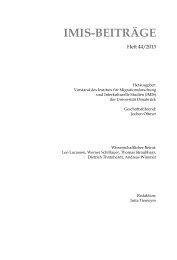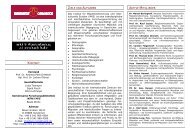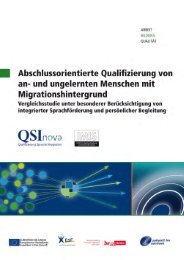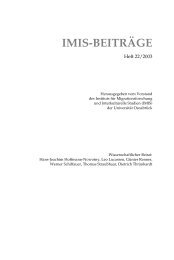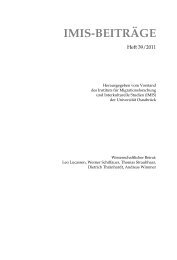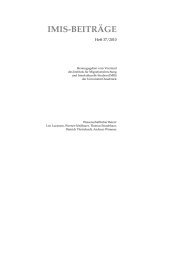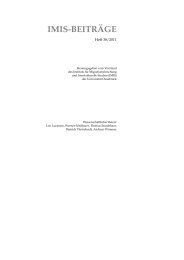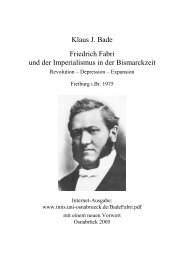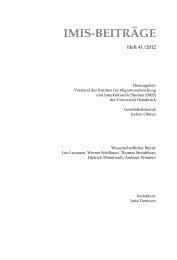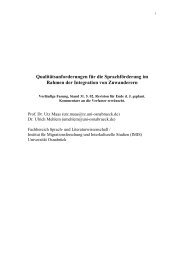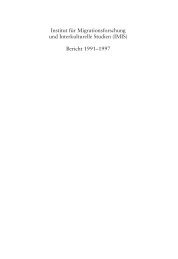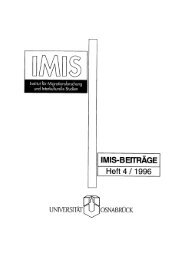Heft 42 - IMIS - Universität Osnabrück
Heft 42 - IMIS - Universität Osnabrück
Heft 42 - IMIS - Universität Osnabrück
Sie wollen auch ein ePaper? Erhöhen Sie die Reichweite Ihrer Titel.
YUMPU macht aus Druck-PDFs automatisch weboptimierte ePaper, die Google liebt.
Sedentarismus als Konstante der Migrationsforschung in Afrika<br />
zahlungen wurde insgesamt als gering eingeschätzt. Nach dem erwähnten<br />
Bericht der Weltbank hat sich diese skeptische Haltung allerdings deutlich<br />
verändert114 : »The old rhetoric of migrants’ remittances being used for ›conspicuous<br />
consumption‹ is being supplanted by an analysis which highlights<br />
both the scale and the economic multiplier effects of the money sent<br />
home«. 115 Nicht nur Finanzströme, sondern auch soziale und kulturelle<br />
Transfers scheinen zum neuen »Entwicklungs-Mantra« 116 zu gehören. So<br />
heißt es in dem Sammelband Global Migration and Development: »Social remittances<br />
– ideas, perceptions, practices and attitudes – are spreading through<br />
the migrant networks and this will influence the lives of people in receiving<br />
and sending areas economically, socially, culturally, and even politically«. 117<br />
Wie Kapur überzeugend darstellt, beruht dieser Enthusiasmus weniger<br />
auf aktuellen Statistiken und Forschungsergebnissen, sondern muss im Kontext<br />
allgemeiner Paradigmenwechsel verstanden werden. Hiermit meint er<br />
jedoch keineswegs einen Perspektivwechsel im Sinne des mobility turn, sondern<br />
das sich wandelnde Verständnis von Entwicklung bzw. Entwicklungspolitik:<br />
»Remittances strike the right cognitive chords. They fit in with a communitarian,<br />
›third way approach‹ and exemplify the principle of self-help. People from poor<br />
countries can just migrate and send back money that not only helps their families,<br />
but their countries as well. Immigrants, rather than governments, then become the<br />
biggest provider of ›foreign aid‹. The general feeling appears to be that his ›private‹<br />
foreign aid is much more likely to go to people who really need it. On the sending<br />
side it does not require a costly government bureaucracy, and on the receiving side<br />
far less of it is likely to be siphoned off into the pockets of corrupt government<br />
officials. It appears to be good for equity and for poverty and yet imposes few<br />
budgetary costs. What could be better?« 118<br />
Da davon ausgegangen wird, dass Migranten wissen, wie am sinnvollsten<br />
›geholfen‹ werden kann, werden ihre Investitionen in den Herkunftskontexten<br />
grundsätzlich positiv bewertet. Es besteht die Vorstellung, dass durch die<br />
Investitionen die entwicklungspolitischen Ideale von Partizipation und<br />
Nachhaltigkeit am ehesten umgesetzt werden können. 119 Dass Migration<br />
114 Vgl. Richard Adams/John Page, Do International Migration and Remittances Reduce<br />
Poverty in Developing Countries?, in: World Development, 33. 2005, S. 1645–1669.<br />
115 Bakewell, Keeping them in their Place, 2007, S. 1.<br />
116 Devesh Kapur, Remittances: the New Development Mantra? Discussion Paper,<br />
World Bank, Washington 2004.<br />
117 Van Naerssen u.a., Global Migration and Development, S. 15.<br />
118 Kapur, Remittances, S. 7.<br />
119 Reynald Blion, North of South: European Immigrants’ Stakeholdings in Southern<br />
Development, in: Deborah Bryceson/Ulla Vuorela (Hg.), The Transnational Family,<br />
85



